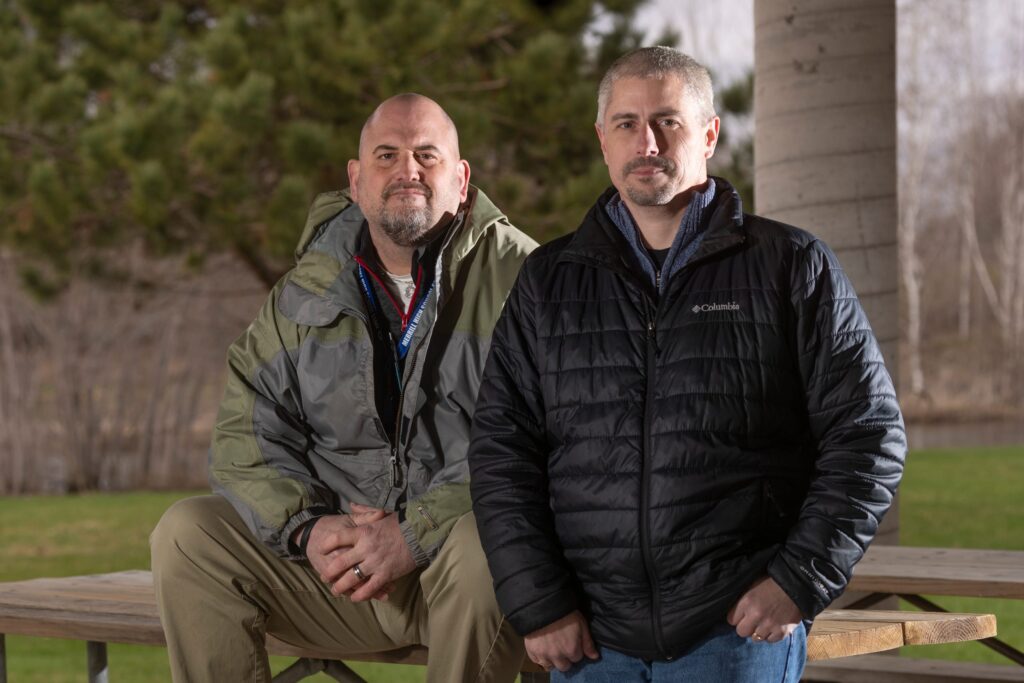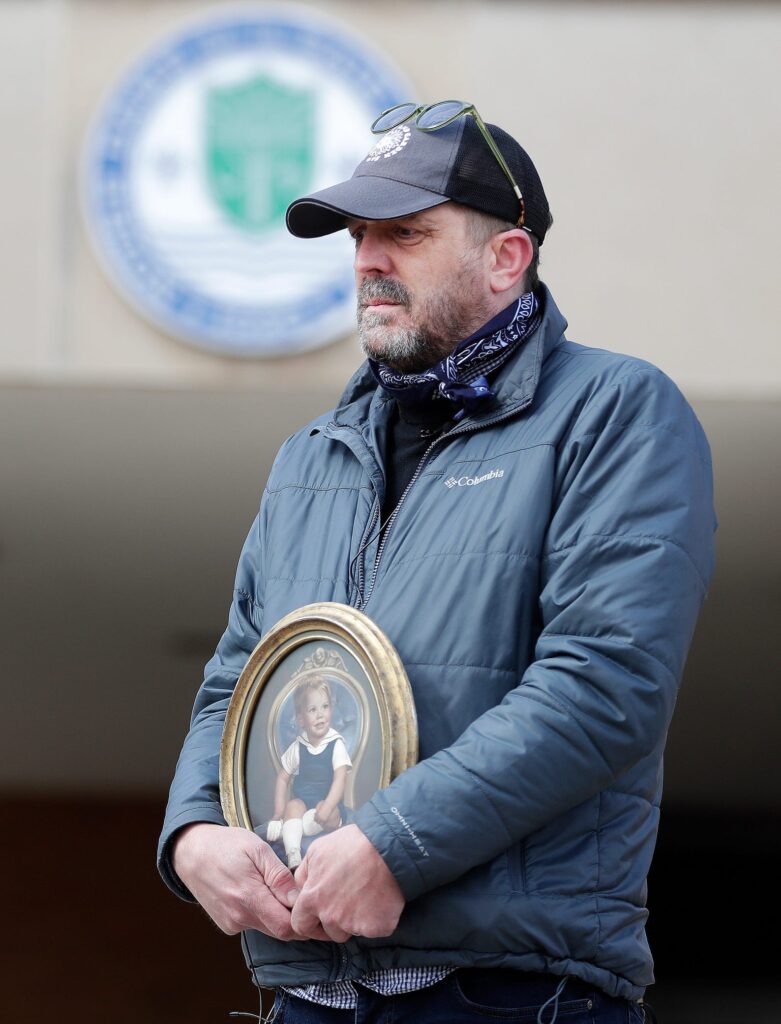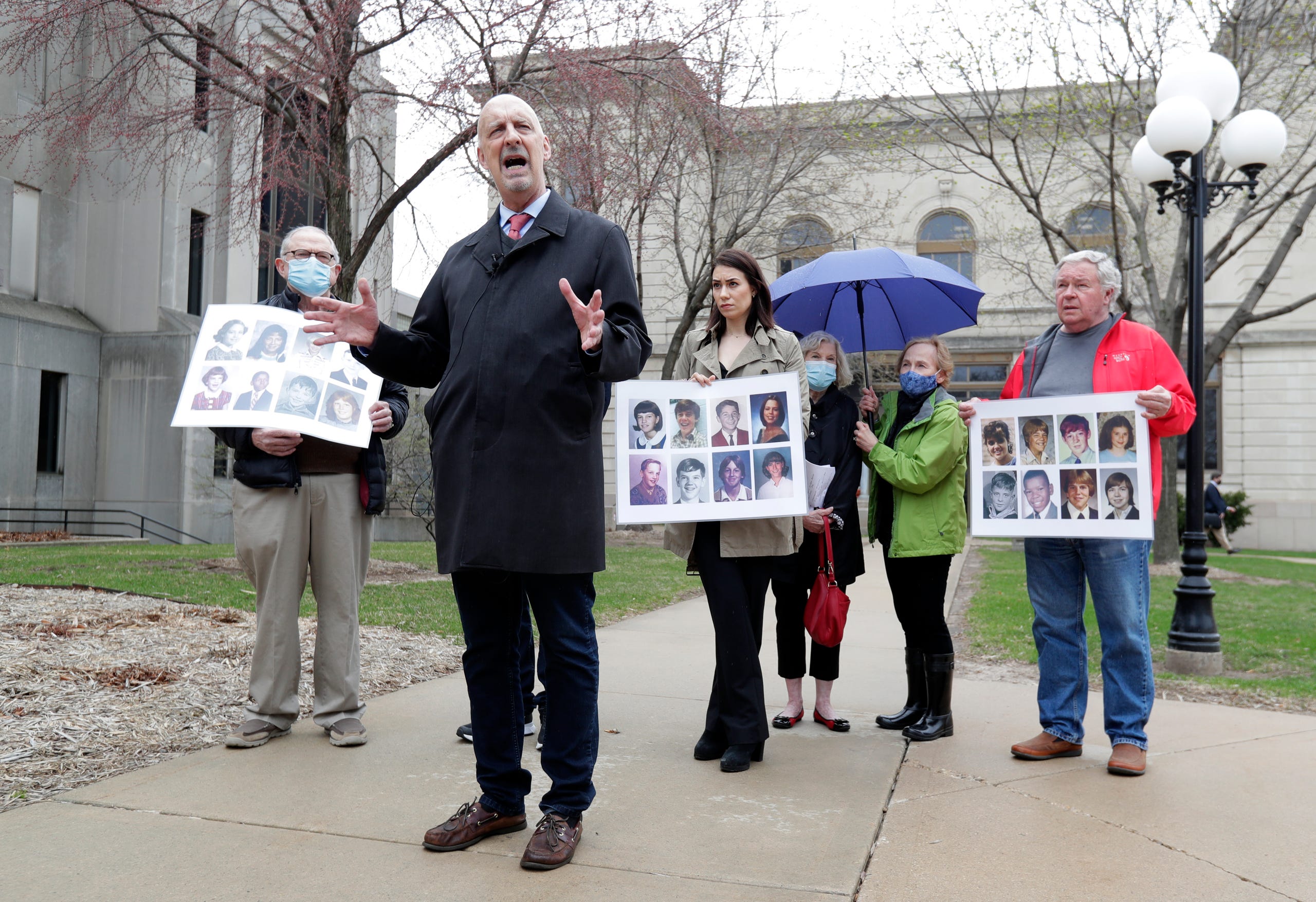MILWAUKEE (WI)
Journal Sentinel [Milwaukee WI]
May 19, 2021
By Laura Schulte and Haley BeMiller
[Photo above: Peter Isely, program director of Nate’s Mission, speaks outside the Brown County District Attorney’s office on April 8, 2021, to advocate for reopening a sex abuse case against a priest with known offenses and ties to St. Norbert Abbey. Sarah Kloepping / USA Today Network-Wisconsin]
Chad Travis recalled that he was 9 years old, strapped into a rig to heal his broken leg, the day he was sexually assaulted by a hospital chaplain in Merrill.
He was essentially immobile when the priest from the hospital’s Holy Cross Chapel hung a tag on the door handle signaling that prayers were going on inside the room, then shut the door and abused him.
Travis didn’t tell many people what happened to him as a child in the late 1970s. But decades later in 2019, he testified at the former priest’s hearing alongside other men who were assaulted as children. Thomas Ericksen wasn’t charged with sexually abusing him — that crime was reported to have happened in a different county from where prosecutors brought their case — but Travis took the opportunity to share his story during the sentencing hearing.
“I was so young that I remember I had an Incredible Hulk robe and a favorite stuffed animal,” Travis told the judge in Sawyer County. “This person I trusted preyed on the innocence of a boy attached to a hospital bed.”
Ericksen, who by 2019 had been stripped of his status as a priest, was sentenced to 30 years in prison. It was the end of a long journey for not only Travis, but for Steve Weix, who fought for years to get police to arrest Ericksen and prosecutors to file charges.
Legal justice was still possible for Travis and Weix decades after they were assaulted, because of a provision in state law that pauses the statute of limitations on sex crimes if an abuser leaves the state and does not return. But both men have struggled to get answers from the Diocese of Superior, which employed Ericksen long after the first allegations of sexual assault surfaced, and to persuade church officials to take ownership of what happened to them.
Weix likened it to a car crash, where the person responsible simply walks away without consequence.
“Things get better at times, but then you wonder if things will ever change, if anybody will ever be held accountable,” he said. “Are they ever going to take responsibility?”
Even Ericksen might have escaped responsibility if he had stayed in Wisconsin after abusing multiple children. The criminal statute of limitations expires for most victims of child sexual assaults when they turn 45, and they can’t sue their abuser or the church after age 35.
Survivors of clergy abuse and their advocates are encouraged by a state Department of Justice investigation that will provide an independent review of allegations dating back decades. But they say justice won’t fully be realized until Wisconsin removes the statute of limitations for civil action in such cases, allowing victims to take their assailants or the organizations that protected them to court at any time.
A bill called the Child Victims Act would change the law and give survivors of childhood sexual abuse that power. But the measure faces an uncertain future in a divided Legislature — complicated further by a years-long effort to kill the legislation from lobbyists that include the Catholic church.
It’s been a struggle for survivors like Laurie Asplund, who was abused by a youth pastor for years in the 1970s. She’s been advocating for the Child Victims Act for 10 years, she said, as both a survivor and a therapist, and she hopes the tide will change and legislators will see the impact it could have for people like her.
“They can help us get started healing as survivors because part of the healing is getting some kind of justice and validation,” she said. “It would help the healing process for us walking wounded.”

First effort in Wisconsin follows infamous Boston report
In 2003, the United States was reeling from a bombshell investigation from The Boston Globe that found hundreds of priests in the Archdiocese of Boston molested children and then were transferred from parish to parish instead of being turned over to police. Reports of child sexual abuse by Catholic clergy had percolated in different parts of the country before then, but the Globe blew the issue wide open.
Lawmakers across the country took notice. In Wisconsin, Republicans and Democrats introduced legislation in 2003 that would extend the statute of limitations for civil and criminal action in child sexual abuse cases. Previous state law required prosecutions to be brought before the victim turned 31, while civil cases had to be filed within five years after the victim discovered the cause of their injury.
Republican Sen. Alberta Darling, who helped bring the bill forward, did not respond to multiple interview requests from USA Today Network-Wisconsin to discuss her work on the legislation and current position on removing the statute of limitations.
Advocates hoped the 2003 legislation would provide a path for justice for survivors of child sexual assault. A key provision they supported would have created what’s known as a look-back window, which gives victims a set period of time to bring forward allegations that expired under the previous time limit. Several states, including Delaware and Minnesota, would go on to open multi-year windows for people to report.
But in Wisconsin, the bill ultimately passed without that window after opposition from Catholic lobbyists.
“How do you deal with decades-old allegations and going back and litigating those claims?” Kim Vercauteren, executive director of the Wisconsin Catholic Conference, said in a recent interview to explain the church’s position.
The final version created the law on the books today: Prosecutors have until a victim turns 45 to bring charges of child sexual assault, sexual exploitation of a child and other crimes against children. In civil cases, a claim must be filed before the victim turns 35 — including lawsuits against a clergy member or religious organization.
The 2003 law also requires clergy members to contact authorities if they believe a child has been sexually assaulted, or if another church leader sexually abused a child. However, they don’t need to report suspected abuse if they find out about it through confidential, private communications such as a confessional, provided the religion’s tenets — whether in writing or not — require those communications to be kept secret.
Vercauteren likened the seal of confession for clergy to counselors who keep most conversations confidential. She also said the requirement to report fellow clergy is one that doesn’t apply to other professionals required to report abuse.
Advocates and lawmakers who wish to change the policy see the exception as a loophole that has allowed church officials to cover up abuse allegations against priests.
“It should be a universal truth that any time someone is found to have information about child sex abuse or sexual abuse of any kind that we go through the appropriate channels,” said state Rep. Kristina Shelton, D-Green Bay.
Church lobbyists sound alarm on ‘radical’ bill
Wisconsin lawmakers revisited the statute of limitations again in 2008 and introduced bipartisan legislation — initially backed by now-Speaker Robin Vos — that would have eliminated the time limit for civil action. But state lobbying records show religious groups, including the Catholic Conference and Wisconsin Council of Religious and Independent Schools, spent hours advocating against the bill.
In his testimony against the legislation, former Milwaukee Archbishop Timothy Dolan argued it unfairly targeted the Catholic Church and would invite litigation that could bleed its institutions dry.
“It will saddle this generation of Catholic people and the next, with the inevitable loss of services and ministries caused by a radical new requirement to deal with the sins and bad judgment of past generations,” Dolan said in January 2008.
Lawmakers held a public hearing on a proposal but never voted on it.
The measure was reintroduced in 2009 and faced similar opposition from lobbyists and Catholic leaders, who repeated arguments that it would ultimately harm the parishioners they serve. Another advocate against it: U.S. Sen. Ron Johnson, who at the time was an Oshkosh businessman on the cusp of winning his first Senate race.
“I believe it is a valid question to ask whether the employer of a perpetrator should also be severely damaged, or possibly destroyed, in our legitimate desire for justice,” Johnson said in 2010, when he served on the Diocese of Green Bay’s finance council.
The bill didn’t get a floor vote that year, either. When Democrats revived the measure in 2019, it never got a public hearing.
‘They can take their power back’
Despite previous failures, advocates see a new opportunity to push for change.
At a theater in downtown Green Bay last month, family and friends of Nate Lindstrom listened to live music and discussed how the Child Victims Act would help survivors of clergy sexual abuse. Lindstrom died by suicide last year, after he revealed memories of three priests at St. Norbert Abbey in De Pere assaulting him. The abbey secretly paid him for 10 years after he first came forward, then discredited his complaints and cut off payments.
No charges were ever filed. Lindstrom was 45 when he died.
Aaron Lindstrom, who helped to found the organization Nate’s Mission, believes the statute of limitations in Wisconsin prohibited his brother from pursuing justice that could have helped him heal. By the time Nate was strong enough to come forward, Aaron said, it was too late.
“It’s the validation that it really happened,” Aaron Lindstrom said. “I think the law saying that it happened would have validated Nate.”

Advocates have started reaching out to lawmakers to gain support for the bill, sharing stories of how survivors of all child sex abuse — not just victims of clergy — would benefit from it. According to the Rape, Abuse & Incest National Network, one in nine girls and one in 53 boys under 18 are sexually assaulted by an adult, and 34% of perpetrators are family members.
A longer window gives survivors more time to remember the abuse and come to terms with their experiences. On average, that doesn’t happen until age 52 — years after the statute of limitations closes the opportunity for legal justice, said Marc Herstand, executive director for the Wisconsin chapter of the National Association of Social Workers.
“The impact of sexual assault is very traumatic, and it can often be decades, maybe until their 40s or 50s before someone has the psychological wherewithal to do something about it,” he said. “And one of the most healing things for a victim is to be able to confront the perpetrator in court.”
Milwaukee Assistant District Attorney Erin Karshen said the legislation could help survivors who face hurdles that take years to overcome before they’re ready to speak out. As children, she said, victims don’t understand the full extent of what happened and could fear getting in trouble or even harming their abuser.
“I think adults, who have so much life experience, would say touching a child is bad. I mean, it’s very binary black and white, like don’t touch a child in a sexual manner. But kids don’t know that,” Karshen said. “We can’t project our adult life experience on children. It’s just so difficult to talk about sex as a society, and it’s so difficult to talk about unwanted or non-consensual sex.”
Karshen said that the Milwaukee County DA’s office gets calls every month from police agencies regarding older cases of sexual abuse. Recently, someone called with a case from 1974 that prosecutors couldn’t pursue because it occurred too long ago under current rules.
“It’s just such a process for victims that it’s heartbreaking to be like ‘Thank you for telling me, but there’s nothing that we can do because the statute of limitations has run (out),'” she said. “So to be able to have the civil option I think would be such a benefit for people.”
As more people come forward and share their stories with investigators and courts, additional perpetrators could be identified and removed from situations involving children, said Herstand, of the social workers association.
The bill also could help survivors see that they aren’t alone, he said, as was the case when victims of USA Gymnastics doctor Larry Nassar began to speak out and contact law enforcement to share their stories.
“You give an opportunity for people to come forward and it does give them a sense that they’re not alone,” Herstand said. “They can take their power back, that was trimmed from them by their abuser.”
It can also help to shift the blame for abuse from survivors to perpetrators, said Ian Henderson of the Wisconsin Coalition Against Sexual Assault.
“I think when you look at the immense societal costs and personal costs to each survivor, the civil justice system has the opportunity to shift those costs onto those who are causing harm and the institutions that may have enabled them,” he said.
Supporters see the act as sending a broader message, too. The statute of limitations can be seen as a measure of society’s tolerance for certain behaviors, Henderson said, and getting rid of that can help Wisconsin be less tolerant of sexual abuse.
“I think most people would agree that child sexual abuse is not a behavior our society should condone or tolerate,” he said. “Hence, removing these arbitrary timeframes makes sense because we don’t want a shorter statute of limitations to play into the hands of people who are causing harm and the institutions that may have enabled them.”
‘Gridlock’ politics, church resistance cloud bill’s fate
Even though it’s gaining steam, the bill’s passage is far from guaranteed as lawmakers contend with the lingering effects of the coronavirus pandemic and continue to butt heads over a range of policies.
Sen. Melissa Agard, D-Madison, said she’s working with colleagues on both sides of the aisle to re-introduce the measure, noting that it has a history of bipartisan support — including tentative backing from former Gov. Scott Walker. But Agard also acknowledged that the legislation has a complicated history.
“Politics in Wisconsin, especially over the last 10 years, have been very partisan,” she said. “It is really unfortunate when issues that aren’t partisan get tied up in that gridlock. I think this is unfortunately one of those examples.”
Agard declined to identify Republicans who are working with her on the measure. Vos, the Assembly leader, and Senate Majority Leader Devin LeMahieu did not respond to interview requests from USA TODAY NETWORK-Wisconsin.
Gov. Tony Evers has signaled he would likely sign the bill if it reached his desk.
Lobbyists can’t register in support or opposition of legislation that hasn’t been introduced, but church officials still have concerns.
Vercauteren, of the Wisconsin Catholic Conference, said victims would be better served by increased access to mental health services and a state registry that tracks misconduct among various professions, including teachers. She also noted that government-run institutions have caps on damages and sovereign immunity, meaning those survivors can’t pursue the same recourse as those victimized by private organizations like churches.
The Catholic church now works closely with law enforcement and has made several changes to its policies, including criminal background checks and new mechanisms to report abuse, Vercauteren said.
“People who are abusers are always looking for opportunities. … I think the church has tried to do as much as possible to try to eliminate those opportunities,” she said.
Abuse survivors say that even with reforms, the church isn’t doing enough to acknowledge the pain and sorrow some clergy members caused, and what their victims have to do to cope.
“They’ll say they’re changing, they’re trying to be transparent and yet they do things like use their power and influence to block legislation there’s so much need for,” said Weix, a Merrill man who recounted an assault by Ericksen, the former priest now in prison. “So victims can finally get their own justice.”
In the past, opponents have argued people could use the change in state law to make false allegations in an attempt to extract money from churches and other organizations. But advocates say the level of questioning and possible public scrutiny that accompany sexual abuse allegations are barriers for those who would make false claims.
According to ChildUSA, a think tank dedicated to preventing child abuse, there have been no cases involving false claims in the courts in states that have passed similar legislation. Herstand said the specter of false claims shouldn’t deter lawmakers from passing the bill.
“You have to weigh the fear that there could be false reports, which there are with every type of crime, but hardly any with this one, versus the reality that we know perpetrators will be identified and these victims will be helped to get justice for the first time,” Herstand said.
Survivors reject claims that they’re in it for the money. Weix acknowledged that financial support would help survivors pay for therapy or medicine but said he ultimately wants organizations that sheltered predators to answer for their transgressions.
“It’s not about money,” he said. “It’s about getting justice. It’s about people taking responsibility for their actions.”
Contact Laura Schulte and Haley BeMiller at leschulte@jrn.com and hbemiller@gannett.com. Follow them on Twitter at @SchulteLaura and @haleybemiller.

